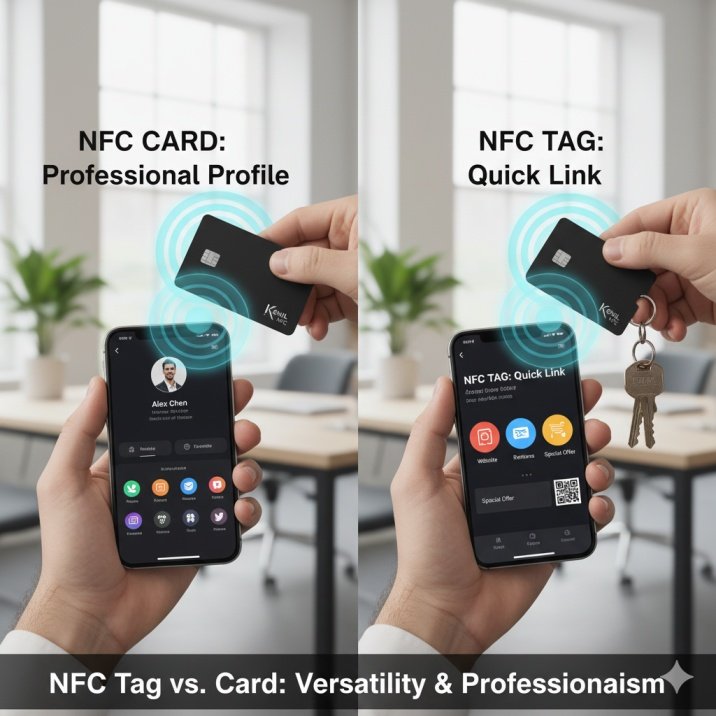NFC (Near Field Communication) technology is transforming how we interact with the physical and digital world. From making payments to sharing information, NFC offers seamless, tap-and-go convenience. While you might be familiar with NFC in payment terminals or smart business cards, the world of NFC extends to smaller, versatile formats like NFC Tags and NFC Cards.
But what exactly sets them apart, and how can you leverage each for your personal or business needs? Let's dive in.
What is NFC? (A Quick Recap)
At its core, NFC allows two electronic devices to communicate when they are brought within a few centimeters of each other. It's the technology behind contactless payments, digital keys, and, increasingly, smart networking tools.
NFC Card: Your Smart Professional Identity
When we talk about an NFC Card, we're typically referring to a credit card-sized item, often made of PVC, metal, or wood, designed to mimic a traditional business card.
Key Characteristics & Use Cases:
- Professional Branding: Designed to be an extension of your brand or personal identity.
- Comprehensive Profile: Stores a link to a rich digital profile that can include contact details (for direct saving), social media links, website, portfolio, video, and more.
- Networking Powerhouse: Ideal for business professionals, entrepreneurs, and anyone looking to make a modern, memorable impression at meetings, events, or casual encounters.
- Durability & Aesthetics: Often crafted with premium materials and finishes, offering a professional look and feel.
- Replace Traditional Business Cards: Eliminates paper waste and ensures your information is always current.
Think of it as: Your complete, dynamic, and eco-friendly digital business card.
NFC Tag: The Versatile Miniature Enabler
An NFC Tag is a much broader category. It refers to small, passive NFC-enabled stickers, keychains, wristbands, or other discreet forms. These tags contain a small microchip and antenna, allowing them to store a small amount of data and communicate with NFC readers (like smartphones).
Key Characteristics & Use Cases:
- Action-Oriented: Often programmed to trigger specific actions or link to specific URLs.
- Miniature & Discrete: Can be integrated into virtually anything due to their small size – keychains, product labels, posters, even clothing.
- Diverse Applications:
- Automation: Tap a tag at home to turn on Wi-Fi, set an alarm, or open an app.
- Marketing & Promotions: Place tags on posters or product displays for instant access to websites, special offers, reviews, or social media pages.
- Smart Key Tags: As KENIL NFC offers, these are key-fob sized tags pre-programmed to share a business profile or specific link.
- Inventory Management: Used for tracking assets or products.
- Event Check-ins: For seamless attendee management.
- Cost-Effective: Generally cheaper per unit than custom NFC cards, especially for bulk applications.
Think of it as: A miniature, programmable trigger for digital interactions or information.
Which One Do You Need?
The choice between an NFC Tag and an NFC Card largely depends on your primary goal:
- Choose an NFC Card if: You want a professional, branded item to replace your physical business card, offering a comprehensive digital profile for networking and making a strong first impression.
- Choose NFC Tags if: You need smaller, versatile items to trigger specific actions, automate tasks, enhance product marketing, or provide simple, direct links in various physical locations (like our Smart Business Key Tags for on-the-go sharing).
Conclusion
Both NFC Tags and NFC Cards harness the power of Near Field Communication to create seamless digital experiences. Whether you're upgrading your networking game with a sleek Smart NFC Business Card or looking for versatile Smart Business Key Tags and other NFC solutions to streamline processes and engage customers, NFC technology is undoubtedly shaping a more connected and efficient future.









